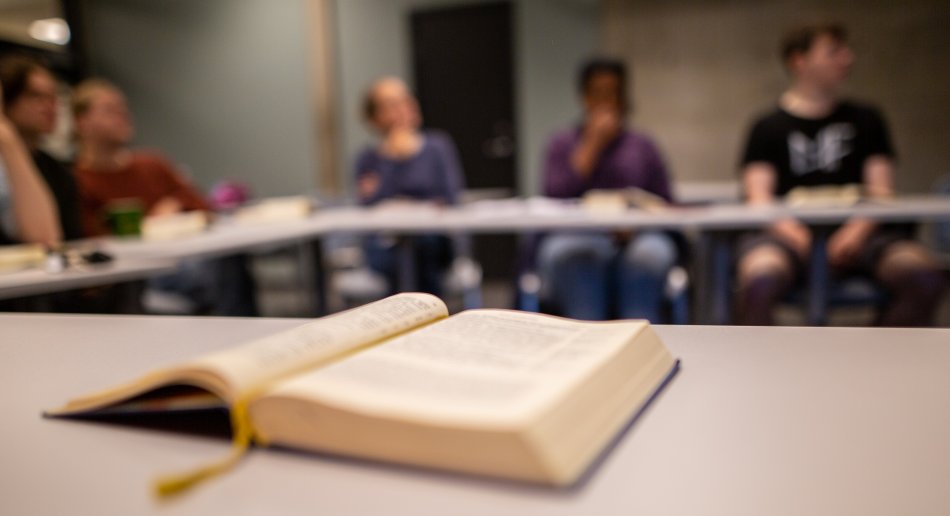
Master in Theology
Study info
- Location: Majorstuen, Oslo
- Progression: Full time
- Duration: 2 years
- Credits: 120
- Start semester: Autumn
- Language: English
- Application code: 2775
Master in Theology provides insight into main topics and debates within Christian theology.
Master in Theology is a two-year programme that focuses on various theological subjects, and offers a solid understanding of Biblical Studies and Systematic Theology.
In addition to in-depth knowledge in fields relevant for academic theological study and research, the programme also provides insight into the philosophy of science and methodological questions and experience in conducting independent scientific studies.
A Master in Theology prepares you for further academic research and contribute to your academic and interdisciplinary understanding.
Our fields of research:
About the study
Admission requirements
If you are an international applicant, please refer to our Application and Admission pages for detailed information in English about the requirements, application deadlines for non-EU applicants (regardless of residency), and the application process in full.
For information about Master i teologi (norskspråklig), please see the programme page.
Programme structure
| 4. Sem | AVH5010 Thesis for Master of Theology (60 ECTS) | ||
| 3. Sem | AVH5010 Thesis for Master of Theology (60 ECTS) | ||
| 2. Sem | MET5030 or MET5010 | TEOL5435
| TEOL5440 or SAM5156 or RL5013 |
| 1. Sem | TEOL5223 The Taboo Bible (10 ECTS) | K5410 Systematic Theology (10 ECTS) | TEOL5450 Constructive Theology (10 ECTS) |
Programme description
The following requirements must be fulfilled to obtain the degree Master of Theology at MF Norwegian School of Theology:
- Theological courses of at least 120 ECTS, all on master level (500(0)-/600(0)-level).
- Theological courses in at least two of the main disciplines of theology (Old Testament, New Testament. Church History, Systematic Theology and Practical Theology). Please note the courses listed in the programme structure are the only theology courses taught in english at MF. Academic credits for theological courses completed at other accredited institutions may be eligible for transfer an will be assessed upon application.
- An independent thesis. Each student is normally assigned a supervisor in connection with the methodology course. The thesis course is normally AVH5010 (60 ECTS). Students may apply to replace AVH5010 with a combination of a smaller thesis course (AVH5015, 30 ECTS) and other relevant courses amounting to 30 ECTS. In order for an application to be accepted the student must already have passed more relevant courses than the 60 ECTS specified in the two first semesters of the programme structure. These courses may for instance be from an exchange done as part of the programme.
- As a main rule, 40 ECTS at the master level, including the course in methodology, must be completed before students can register for the master's thesis.
- As a main rule, all courses within the programme must be completed before the thesis can be submitted.
- at least 60 ECTS (included thesis) must be completed at MF Norwegian School of Theology to obtain the degree. Documented equivalent studies from other academic institutions can be included in the programme.
Programme Structure and Requirements
The programme consists of two major parts: course work with final assessment in each course, and a thesis work with a final assessment, including an oral examination. The course work will amount 60 ECTS credits (dependent on thesis size) and includes between about 5000 to 6000 pages of required reading in English and active participation in lectures and seminars. The thesis work amounts to 60 ECTS credits comprising writing of a thesis under the supervision of a faculty supervisor on a mutually agreed topic and based on additional literature (as necessary). The thesis is to be an independent scholarly research work.
The syllabus of the programme consists of different kinds of courses. The core courses are required and make up a core curriculum common for all students. The elective(s) may be chosen according to the particular needs and interests of the student.
What is ECTS?
ECTS - The European Credit Transfer System - is the European system for calculating the student workload required to achieve the objectives of a programme. This European integration of calculating the student workload is one of the objectives of the Bologna Declaration (1999) with its ultimate goal stated in 2001 to create a «European higher education area».
One credit is around 25-30 working hours. 60 ECTS is one year of study, amounting to 1500-1800 working hours. 10 Ects normally requires 6-7 weeks of full-time work.
Method of instruction
Learning and Teaching Methods
MF Norwegian School of Theology offers lectures and seminars taught in English. Only parts of the curriculum will be taught. The students are expected to be present in the classes that are set up for the master programme. They are encouraged to form informal study groups among themselves. Contracted tuition and supervision is provided during the writing of the Thesis.
Assessment methods:
Most courses have different course work/assignments (book reports, essays, seminar presentations) to be completed during the lectures/seminars, and in the end of the course there is final assessment (written examination, thesis and oral examination).
Learning outcome
Learning outcomes: The programme Master of Theology as a whole will give the student:
- in-depth knowledge in fields relevant for academic theological study and research
- an academic and interdisciplinary understanding
- ability for independent academic reflection, methodical study of academic literature and written presentation thereof
- insight on philosophy of science and methodological questions, and experience in conducting independent scientific studies
- a basis for further academic research
- necessary skills for working in school, church and society
- a better foundation for communicating academic theological insights in dialogue with other academic disciplines and with other partners within the realm of society and culture
KNOWLEDGE
The candidate:
- has in-depth knowledge in fields relevant for academic theological study and research
- has an academic and interdisciplinary understanding of theology as an academic discipline
- has insight in philosophy of science and methodological questions
SKILLS
The candidate:
- has the ability to carry out independent academic reflection, methodical study of academic literature and written presentation thereof
- has experience in conducting independent scientific studies
has the ability to communicate academic theological insights in dialogue with other academic disciplines and with other partners within the realm of society and culture
GENERAL COMPETENCE
The candidate:
- has a basis for further academic research
- has the necessary skills for working in school, church and society
- has basic insight in Christian and religious topics which are asked for in churches, media, organizations and the culture at large
Qualification after completing the program is Master of Philosophy in Theology.
Exchange programme
MF has exchange agreements with several partner universities. You can find more information about exchange opportunities for your study programme on this page.
Be sure to plan and apply for the exchange well in advance in order to secure a spot.
MF recommends that students that wish to do an exchange do so in their third semester. This means that you also have to apply for a smaller thesis course (30 ECTS thesis course instead of 60 ECTS), cf. information about master's thesis under "Program Description". Alternatively we recommend to do an exchange in the second semester. Applying for an exchange in the first semester is reserved for students already accepted to one of MFs other study programmes.

